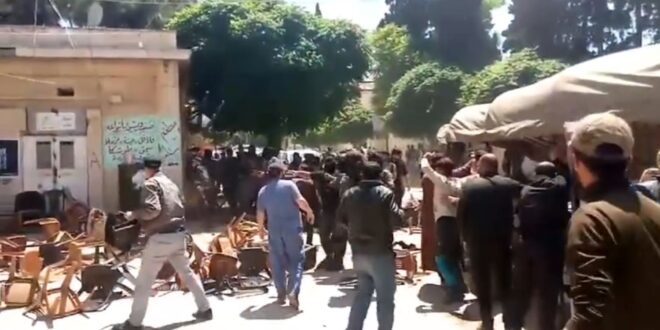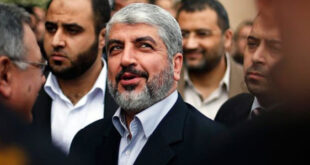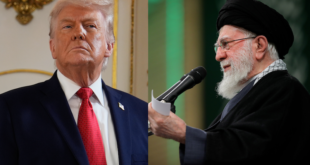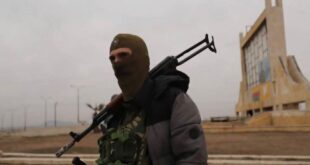On May 13, protesters established a sit-in tent outside the military court building in Idlib, calling for the release of detainees.
Members of Hay’at Tahrir al-Sham (HTS) dispersed the gathering in a protest tent in the center of Idlib City, using force and batons amidst gunfire.
Enab Baladi’s correspondent in Idlib reported that security members assaulted protesters in front of the Military Court on al-Jalaa Street in central Idlib, clashing with them on Tuesday, May 14.
According to the correspondent, the members damaged the tent’s furniture and fired shots into the air to disperse the demonstrators, who were chanting slogans demanding the resignation of HTS leader Abu Muhammad al-Julani. The members were labelled as “shabiha,” amidst mutual accusations and allegations of treason.
The correspondent noted that these members are part of the Public Security Department, established by the Salvation Government in March, operating under the Ministry of Interior’s supervision. It is a reformation of the former Public Security Agency, the security wing of the authority.
As of the time of writing, the Ministry of Interior of the Salvation Government has not issued any statement regarding the incident, nor has HTS provided any comment.
What is the story of the tent
On May 13, protesters established a sit-in tent outside the military court building in Idlib, calling for the release of detainees.
The demonstrators displayed banners urging the release of foreign nationals held in HTS prisons, accused of treason, and detained for years without knowledge of the charges against them or any legal recourse.
Following this, HTS and its political wing dispatched a delegation to the tent, seeking dialogue. However, the protesters refused to engage in talks until the innocent detainees were released. Subsequently, Ibrahim Shasho was appointed as the head of the Judicial Inspection Authority within the ministry.
Non-stop protests
Since February 26th, the movement demanding the ousting of Julani and the rejection of exclusive decision-making policies, spearheaded by civilian activists and backed by military and legitimate figures, has persisted. This momentum has intensified, particularly following the exposure of torture in HTS prisons.
In response to the demonstrations, there have been promises, reforms, and extensive meetings involving Julani, the Salvation Government, and the General Shura Council. These measures include the proposal of a general amnesty for detainees with certain conditions and exceptions, the establishment of committees to listen to residents’ grievances, and the elimination of building fees, with partial exemptions under specific conditions.
Researchers and governance experts, as outlined in a previous report by Enab Baladi, suggest that describing the governance system in Idlib as a presidential one across all executive, legislative, and military channels may oversimplify matters. This is due to the influence of Julani, who appears to exert control over decision-making processes, thereby holding sway over the entire system.
 Eurasia Press & News
Eurasia Press & News



